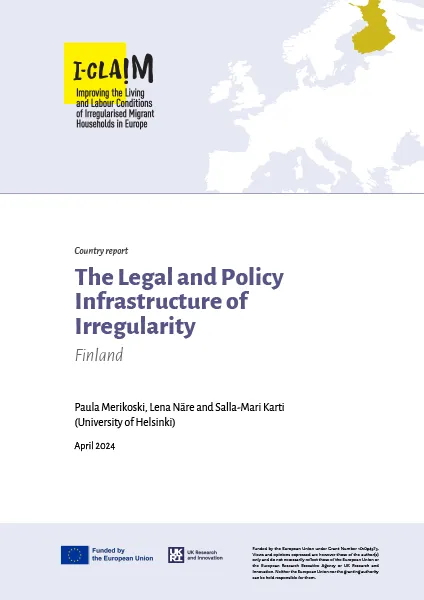The Legal and Policy Infrastructure of Irregularity: Finland
Paula Merikoski, Lena Näre and Salla-Mari Karti
How to cite:
Merikoski, P., Karti, S. and Näre, L. (2024) The legal and policy infrastructure of irregularity: Finland. I-CLAIM. DOI: https://zenodo.org/records/11066291
The Legal and Policy Infrastructure of Irregularity: Finland
Paula Merikoski, Lena Näre and Salla-Mari Karti
The purpose of this report is to examine the legal and policy infrastructures of migrant irregularity in Finland. Improving the Living and Labour Conditions of Irregularised Migrant Households in Europe (I-CLAIM) is a research project, in which migrant irregularity is understood as produced by immigration and asylum laws, policies, and practices, as well as labour market and welfare regimes and political, media, and public narratives. Irregularity is not an intrinsic quality of an individual or a group of people; rather, it is a situation in which people find themselves due to various causes. This report is based on an I-CLAIM work package consisting of the analysis of a variety of policy documents and reports on irregularity, including preparatory legal documents, law texts, political programmes, material produced by ministries, research-based reports, and information publicly available on relevant institutional websites. Furthermore, interviews conducted with 12 experts representing different fields of expertise have guided the analysis and provided valuable insight into how state practitioners, NGOs, and other relevant stakeholders operate, as well as the current state of the living and working conditions of irregularised migrants and their families in Finland.
The report presents general trends and features of migrant irregularity in Finland, including estimates of the number of irregularised people and the most common characteristics of irregularised situations that we have identified. It discusses key policy and legal changes from the last 20 years, and routes into and out of irregularity, including key legislative and policy changes that Petteri Orpo’s right-wing government is planning. The on-going and planned changes in migration legislation adopted in Orpo’s government programme constitute a paradigm shift in Finnish migration policies. Some of the planned changes may contribute to increasing the number of migrants living in irregular situations in the future, as well as their access to basic rights such as health care and housing for irregularised migrants.
In Finland, migrant irregularity is considered by most interviewed experts to be a relatively limited phenomenon compared to many other EU Member States, with the estimated number of people in irregular situations being between 3,000 and 6,000. There was a significant increase in the number of irregularised migrants after the asylum ‘crisis’ of 2015–2016. In 2015, the number of asylum seekers increased from 3,600 in 2014 to over 32,400 in 2015 (Migri 2024a). As a result, changes to the Finnish asylum policy and legislation were rapidly introduced in 2016 in order to make Finland an undesirable country to seek asylum in. Due to these changes, and others described in this report, it became more difficult for asylum applicants to obtain international protection or otherwise regularise their stay, thus making it easier for people to end up in an irregular situation (Ahonen & Kallius 2019; Näre 2020a). While rejected asylum seekers are considered to be the biggest group of irregularised migrants in Finland, migrants can find themselves in an irregular situation due to various other reasons: due to a loss of a job and subsequent loss of a visa, due to the lack of a valid travel document, due to a negative decision on a residence permit application or its renewal, due to overstaying their visa, or due to not having a visa or residence permit in the first place. Furthermore, ‘irregularised from the perspective of health care’ is a categorisation used by some stakeholders to describe all those falling outside of the welfare state’s health and social services, including EU citizens who have not registered their stay in Finland.
The report also examines the entanglements between employment and welfare regimes, focusing on the labour market sectors of agrifood, domestic work, and cleaning. Employment is one of the main routes out of an irregular situation. However, the possibilities for employment for migrants in irregular situations are limited because of the requirements for the residence permit. For example, the requirement for a valid travel and identification document excludes certain nationals and groups from applying for the permit even if they find employment. Furthermore, among the many changes that Orpo’s government is proposing is a tightening of the criteria for employment-based residence permits and preventing the possibility for asylum seekers to apply for an employment-based residence permit. The report also discusses other routes out of irregularity, and the challenges and opportunities related to regularising one’s status through different types of residence permits. Here, the focus includes the household perspective, including a discussion of the processes for family reunification. Finally, the report discusses how discrimination and the racialisation of migration regimes differentiate people based on their nationalities and the impact of this on the accessibility of residence permits, revealing structural racism and discrimination in Finland.
